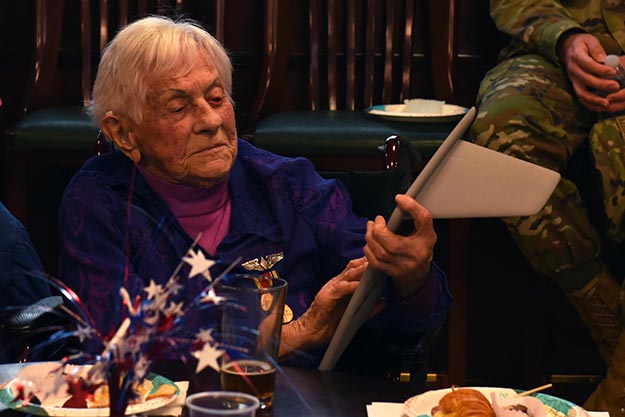JOINT BASE LEWIS-MCCHORD - Team McChord had the honor of hosting Ms. Betty Dybbro, the last surviving Women's Auxiliary Service Pilot in Washington state, here in celebration of Women's History Month on March 8, 2023.
Team McChord airmen gathered in the 8th Airlift Squadron's Heritage Room to hear Dybbro's stories, celebrate her service, and thank her for paving the way for not only women in aviation - but all women in the military.
The Women's Auxiliary Service Pilots, or WASPS, purpose was to free male pilots for combat roles during World War II. Despite various members of the armed forces being involved in the creation of the program, the WASP and its members had no military standing.
Dybbro grew up in rural Indiana and read about a call for female pilots in a magazine and applied. Over 25,000 women applied, 1,830 were accepted and 1,074 graduated from the rigorous eight-month program in Sweetwater, Texas. She had her wings pinned in August of 1944.
"My parents found out I was flying because my solo flight showed up in the newspaper!" said Dybbro. "But they were very supportive parents."
Dybbro spent one year in the WASP program in the early 1940's, where she learned how to fly and repair military planes, transport aircraft and participated in dangerous artillery drills and strafing. During her service, she was proficient in piloting the Vultee BT-13 Valiant, North American AT-6 Texan, Martin B-26 Marauder, and the Boeing B-17 Flying Fortress.
Her first assignment was in Marfa, Texas, where she says the climate was less than welcoming for women pilots.
"The assigned WASPS got to Texas, and the commanding officer wouldn't talk to us," said Dybbro. "He wouldn't let us fly; it seemed like no woman was going to touch his aircraft."
All these obstacles thrown in front of the WASP because of their gender made her angry because they had something to offer and they knew it, Dybbro has said.
Dybbro and her fellow WASPS were then transferred to Las Vegas, where they began their service to their country. After arriving, her favorite aircraft to fly became the AT-6 and the B-17.
By December of 1944, the war was turning in favor of the allies and male pilots were sent back stateside to take the positions previously filled by WASPS; thus ending the WASP program.
Post-service WASPS were taken off flying status and did not receive any honors or military benefits for their service. It wasn't until 1976 that they received their recognition in the form of a Congressional Gold Medal.
When interviewed years ago and asked whether she felt the need for recognition after so many years, Dybbro replied that just being able to fly the airplanes was enough - a statement she reiterated while meeting with Team McChord airmen.
Many Team McChord airmen came up to thank Dybbro for what women like her and her fellow WASPS, set into motion - especially Team McChord's women in aviation. While thanking her for her service and trailblazing; many women pilots reiterated that they wouldn't be where they are without women like Dybbro.
"I would not have traded that experience for anything, that (her time spent as a WASP) was the most pleasant year of my life," said Dybbro.





Read Comments